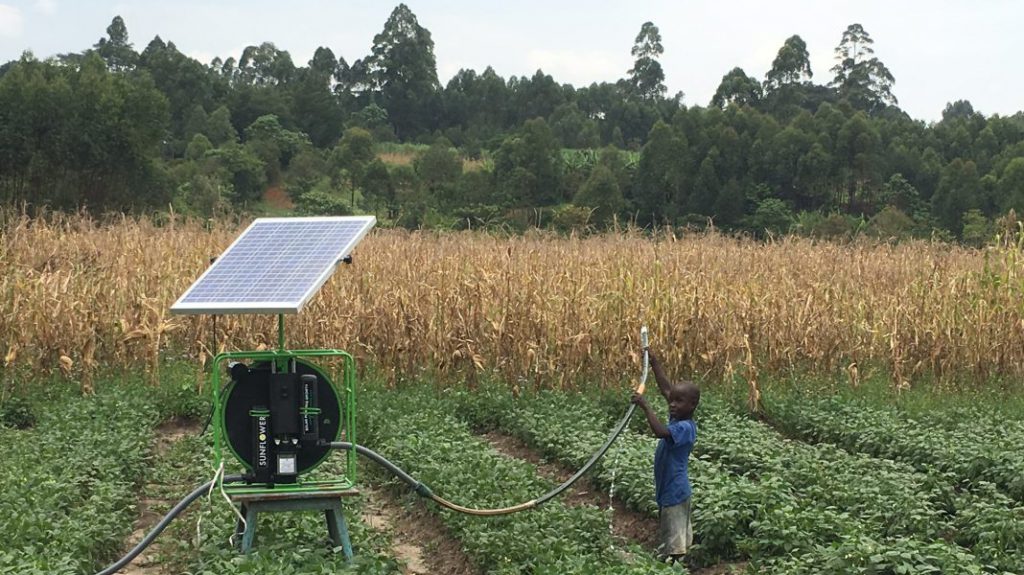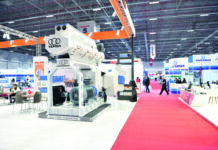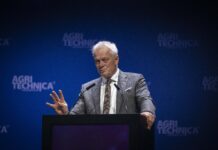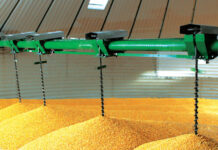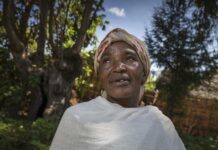Solar power is good for the environment. It is also inexpensive. And in developing countries, it can provide energy in places the electrical grid doesn’t reach.
It can also do much more. It can—and does—play a central role in catalyzing larger economic and social change.
For instance, World Neighbors runs community-centered development projects in Kenya. This is some of what solar panels are doing to help initiate sustainable development among rural farming communities.
Mobile solar water pump
This device was originally developed for small-scale farmers around Lake Victoria. It is a sturdy unit and easy to move, wheelbarrow style. There is a standard version, incorporating two 80-watt solar panels and two electric pumps, and a half-size version with two 40-watt panels and one pump.
The pumps are generally used for crop irrigation. They are also a central piece of more extensive sustainable fish and vegetable production. Here’s how it works:
Farmers dig large plastic-lined ponds to retain precious rainwater. Tilapia and other fish are deposited in the ponds—each pond holds about 1,000 fish.
The water from the ponds, which contains nutrients from fish waste, is used in drip irrigation systems to water multiple crops, including kale. The water is pumped from the ponds using solar powered pumps. The pumped water is replenished from tanks that store additional captured rainwater. The inedible parts of the vegetables, as well as some kitchen waste, are in turn used as fish feed.
Since it uses captured rainwater and solar power, the system has virtually no operating costs. By catching the rainwater, using the sun for power, and feeding the fish with organic waste, the cycle costs the farmers very little after the initial investment of the solar powered pump. The scalable system provides more than enough vegetables and fish for a village. The increased surplus of food and vegetables is sold in local markets. Profits are used in a collective savings and credit program that provides working capital for additional fishponds, pumps, rainwater storage tanks, greenhouses, beehives, and many other agricultural activities. As an added bonus, the panels can be used during the rainy season to boost a home solar system.
Solar incubators
Raising poultry requires a steady supply of chicks. These chicks need to be housed in incubators. Unreliable electrical supplies can wipe out a family’s entire investment. A solar incubator helps solve that problem.
The incubator comes with an 80-watt solar panel, a charger controller with a 100-amp-hour battery and a main charger. Incubation continues normally during power outages.
Solar vegetable drier
Small-scale agriculture is completely dependent upon the weather. Understandably, the main focus is on how a lack of rainfall depresses food output and can lead to hunger and even starvation.
But even in the good times, the rainy season can cause problems for farmers in countries that lack the extensive private and public insurance and income support taken for granted in developed countries. During Kenya’s rainy season, various types of green vegetables flood the market and prices drop sharply. What is good for buyers can be disastrous for small-scale producers.
An effective solution is solar vegetable driers. The easy-to-use driers increase the shelf life of otherwise highly perishable commodities. This reduces food waste. As important, the dried food can be sold later for higher prices.This allows farmers to earn a sufficient profit to invest in additional equipment to expand output.
The CooKit
The CooKit is a solar powered cooker. It reduces the annual demand for fuel wood by at least four times. With careful use and storage, a CooKit can be used for two years, reducing fuel wood consumption drastically and helping reduce deforestation.
Solar-cooked foods retain vitamins, nutrients and their natural flavors: there is no smoky taste and the foods cook slowly in their own juices. Nutritious, and inexpensive traditional foods (beans, root crops, and some grains) have been restored to family diets.
Without the need to gather firewood or dung, inhale smoke, and tend a fire – all associated with traditional cooking – solar cooking reduces labor, especially for women. A person can cook while at work, at the market, or tending crops. Young girls can attend school instead of searching for firewood.
The smokeless cooking process reduces respiratory diseases and eye irritation. People with HIV/AIDS and other illnesses, the elderly, disabled and young orphans all benefit from the efficiency and ease of solar cookers.
In addition to cooking, it can pasteurize household drinking water, making it safe to drink.
These solar-powered initiatives are combined with literacy training, savings and credit programs and courses in basic business skills. The result: Increased output and incomes, including profits invested to further expand production and sales



